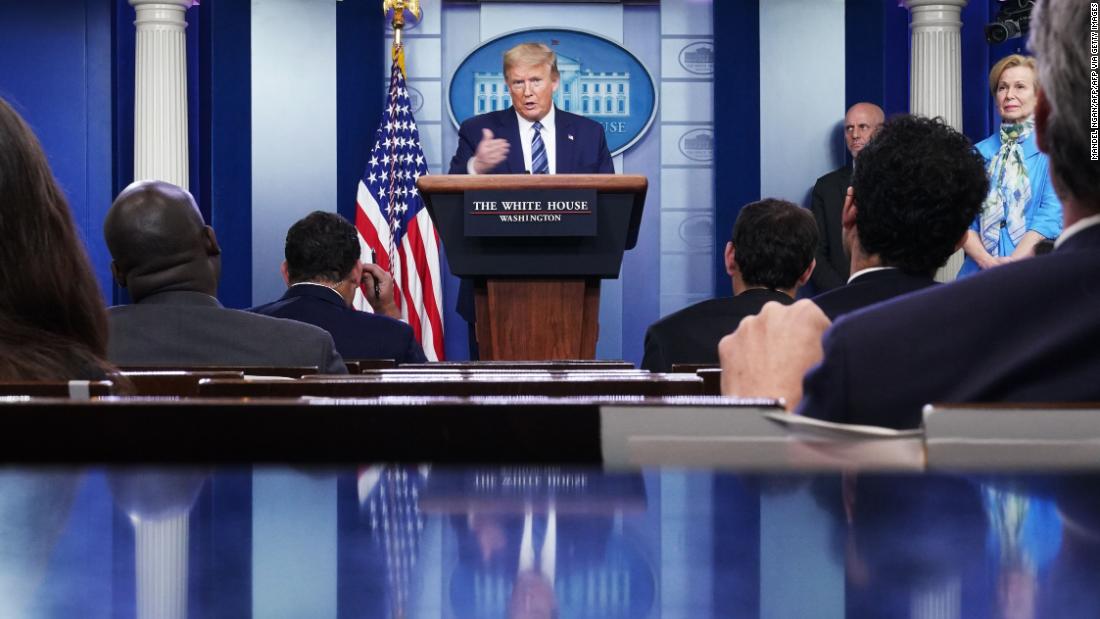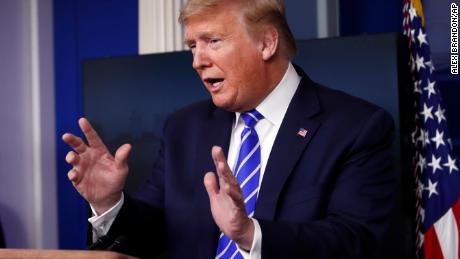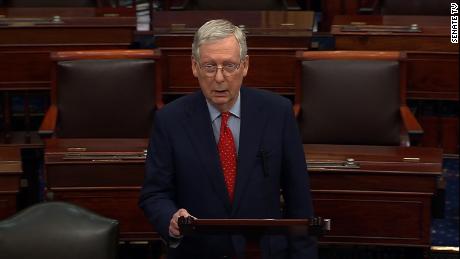First, the President insisted he was simply being sarcastic. Then he began blaming the media.
Asked by CNN’s Jake Tapper what the American people should know about disinfectants and the human body, she instead defended the President’s tendency to muse aloud about his ideas as he processes new information, and suggested that the media had missed the point of the White House presentation.
Birx noted that when Trump made the remark Thursday, he was engaged in a “dialogue” with William Bryan, the acting head of science at the Department of Homeland Security, about a study detailing the use of light and disinfectants to help kill the coronavirus on surfaces.
“I think I’ve made it clear that this was a musing, as you described,” Birx told Tapper on “State of the Union” Sunday, dodging a question about whether she’s bothered by having to spend time discussing the President’s comments, by criticizing “the news cycle.”
“I think we’re missing the bigger pieces of what we need to be doing as an American people to continue to protect one another,” Birx said. “We should be having that dialogue about asymptomatics. We should be having that dialogue about this unique clotting that we’re seeing.”
Bruised by the avalanche of negative coverage and reprimands from public health experts, Trump retreated into the recesses of the White House this weekend, emerging only on Twitter where he aired his grievances about his press coverage. He took no questions at his briefing Friday and in a departure from recent weeks, there was no White House press conference Saturday and none scheduled so far for Sunday.
The consequences were serious: in the past few days state officials and disinfectant manufacturers repeatedly warned Americans about the dangers of using chemicals or household cleaners in any other manner than what is printed on the label.
“Injecting, ingesting, snorting household cleaners is dangerous,” Ezike warned. “It is not advised and can be deadly.”
Trump’s controversial comments offered an opening to Biden, who weighed in on Twitter: “I can’t believe I have to say this,” Biden tweeted Friday, but please don’t drink bleach.”
Democratic House Speaker Nancy Pelosi on Sunday likened the President’s suggestion to “embalming,” telling Tapper on CNN’s “State of the Union,” “We spend a lot of time on what the President said, when, and — disinfectant in the body. You know what they call that? They call that embalming. That’s the medical term.”
Shifting explanations from the White House
In the midst of shifting explanations from the White House about the context of Trump’s remarks in Thursday evening’s briefing, the President hinted Saturday that his days at the briefing room podium might be coming to an end.
In one tweet, Trump questioned the value of holding White House press briefings, saying they are “not worth the time & effort” if the media is going to just ask “nothing but hostile questions.” Trump also noted the “record ratings” for his appearances.
In a subsequent tweet, he tried to rewrite the narrative about his own early skepticism about the origins and potential spread of Covid-19.
“I never said the pandemic was a Hoax! Who would say such a thing?” Trump tweeted Saturday. “I said that the Do Nothing Democrats, together with their Mainstream Media partners, are the Hoax. They have been called out & embarrassed on this, even admitting they were wrong, but continue to spread the lie!”
Trump continued to try to shift blame to reporters for misunderstanding him throughout the weekend.
“I was asking a very sarcastic question to the reporters in the room about disinfectant on the inside. But it does kill it, and it would kill it on the hands, and that would make things much better. That was done in the form of a sarcastic question to the reporters,” Trump said Friday.
White House press secretary Kayleigh McEnany told reporters the President’s remarks were simply taken out of context.
On Saturday, Trump continued the debate, curiously quibbling with the fact that reporters had recounted his back-and-forth with Birx about the effect of heat, sun and light on the coronavirus, asserting that he was speaking to “our Laboratory expert, not Deborah, about sunlight etc. & Coronavirus.”
Shortly before Trump’s Thursday remarks, he had been briefed by Bryan, who had presented findings from a study about whether the spread of coronavirus could be slowed by warmer weather.
Bryan summarized the study in the briefing room, also discussing how ultraviolet rays and disinfectants, including bleach and alcohol, may shorten the life of the virus. (Bryan does not have a medical background and is not a scientist.)
That seemed to carry Trump’s train of thought toward the notion that disinfectant might be used inside the body: “I see the disinfectant, where it knocks it out in a minute. One minute. Is there a way we can do something like that, by injection inside or almost a cleaning?” Trump said Thursday during the briefing. “Because you see it gets on the lungs and does a tremendous number on the lungs.”
On “State of the Union” Sunday, Birx said the President “understood” after he turned to her during Thursday’s briefing, asked about the impact of the light and heat on coronavirus, “that it was not [used] as a treatment.”
She said what got lost in the debate was that the “study was critically important for the American people.”
“We had an MIT study just from a few weeks ago that suggests when people are talking and singing, aerosolized virus could be moving forward. What this study showed for the first time is that sunlight can impact that aerosolization outside,” Birx told Tapper.
“This is why we asked them to do it. We’re trying to understand why people should be wearing masks,” Birx added. “You’re wearing masks because you could have asymptomatic infection and you will decrease your transmission to others. I think the half-life in the sunlight is very important as we move forward to really understand how we can effectively create decontaminations in different environments.”
McEnany pushed back on reporters’ questions Saturday over whether the White House was sending mixed messages about the context of the President’s suggestion.
“Taking a sarcastic comment and running with negative headlines is the definition of taking something out of context, so I believe those answers are very much in sync,” she told reporters at the White House.
McEnany would not say whether the President plans to dial back his participation in the coronavirus task force briefings after his abrupt departure from the briefing room Friday.
“I leave that to the President,” she said. “That’s entirely his decision, but I believe the President is at his best when he’s speaking directly to the American people.”
When asked why he did not take questions Friday, she noted that “the President has taken questions for 49 briefings since the end of February.”
This story has been updated with additional comments from House Speaker Nancy Pelosi and Dr. Deborah Birx on “State of the Union.”
CNN’s Aaron Pellish, Alison Main and Chuck Johnston contributed to this report.
![]()






